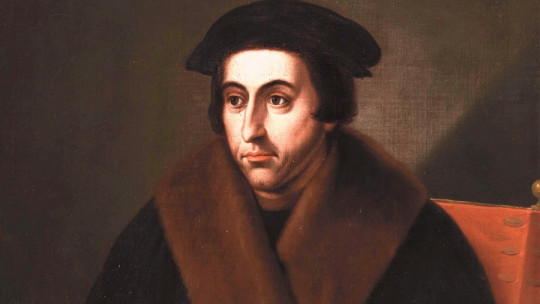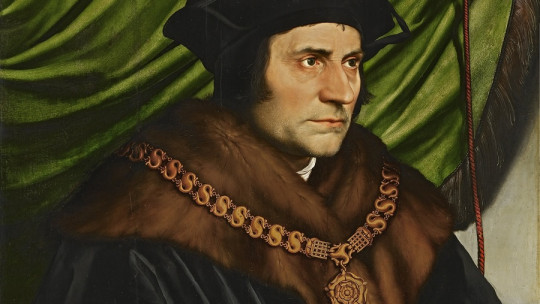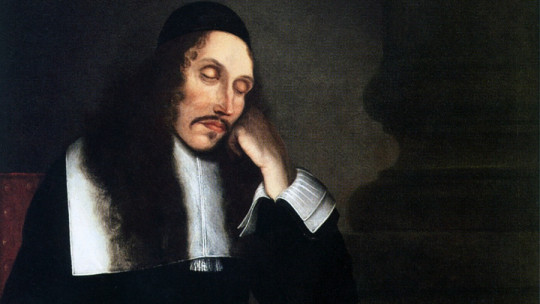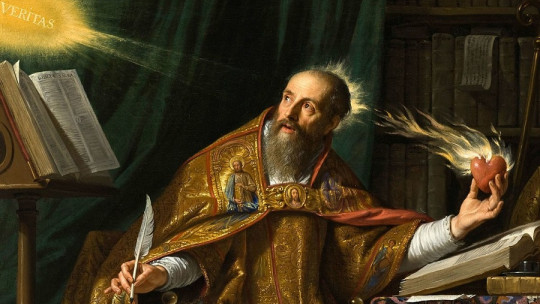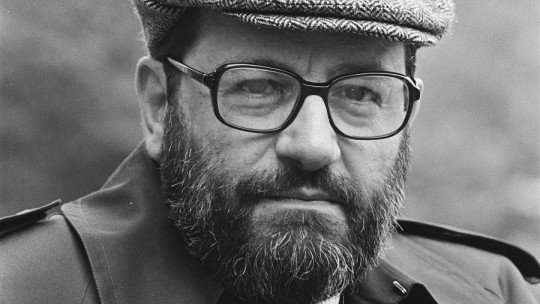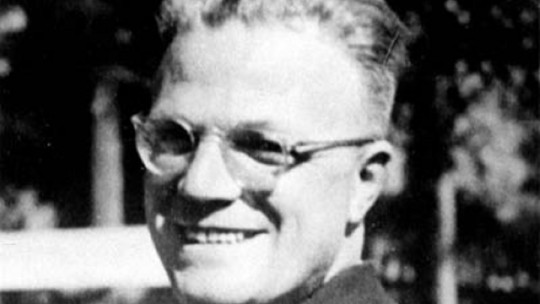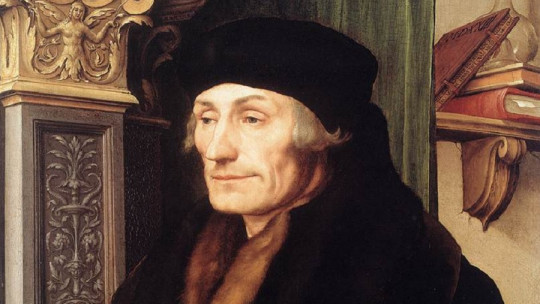
Seen by some as a heretic who paved the way for the Protestant Reformation, by others as a coward who was not actively involved in such a reform. The figure of Erasmus of Rotterdam is acclaimed and, at the same time, hated in a chiaroscuro of opinions and beliefs.
Be that as it may, there is no doubt that this Dutch philosopher was a man of humanist ideas, a son of the Renaissance in which he lived and gave a new interpretation to the Bible and the Catholic faith.
Despite ending up quite detested by the two religious sides that “coexisted” in 16th century Europe, the truth (and irony) is that Erasmus of Rotterdam was a pacifist, faithful to the Church and condemned any fight for the sake of religion. Let’s see below his interesting and intense life through a biography of Erasmus of Rotterdam
Brief biography of Erasmus of Rotterdam
Erasmus of Rotterdam (Dutch Desiderius Erasmus van Rotterdam and Latin Desiderius Erasmus Roterodamus) was born on October 28, 1466 in Rotterdam, Netherlands. He grew up in a family involved in religious issues since his father was a priest, from Gouda, and his mother was a woman of bourgeois origin which gave the family certain comforts.
Between 1478 and 1483 he attended Saint Lebwin’s school in Deventer, where he would have the opportunity to meet people such as Alexander Hegius and establish contact with humanism. This first contact would be transcendental in the work and life of Erasmus of Rotterdam since, in the long run, He would be known as “the prince of humanists”
In 1492 he was ordained a priest by the order of Saint Augustine and, after that, he decided to travel to France to study at the University of Paris. The French capital had become a bustling city, in which thinkers of all types and conditions shared knowledge in the midst of the Renaissance, a movement that France experienced as intensely as it did in Italy. By having access to all kinds of new opinions and currents, Erasmus began to shape his particular humanist thinking at this time.
Beginnings of his philosophical training
Erasmus of Rotterdam was always a traveler Although interesting, his life in Paris was not interesting enough for him to stay longer, deciding to leave for England and residing in London between 1499 and 1500, where he would meet John Colet and attend Oxford University. Colet taught Erasmus many things about the life of Saint Paul, carrying out an intense and profound reading of the Bible under a humanist and novel vision.
It would also be during this time that Erasmus, together with the collaboration of Publio Fausto Andrelini, would write his book “Adagios”, which originally consisted of 800 proverbs and morals extracted from the ancient traditions of Greece and Rome, as well as comments by the author. about its origin and meaning. This proverb would acquire importance at a popular level, with many of them being used today. Erasmus would expand it throughout his life, having 3,400 proverbs in 1521 and 5,251 at the time of his death.
During his stay in England he began to hold a professorship as a full professor of Theology at the University of Cambridge, a place where he would meet great thinkers of the British philosophical and intellectual scene, including Thomas More and Thomas Linacre. In addition, he was offered a lifetime job at Queen’s College of that same university, but Erasmus’s restless traveling spirit led him to reject it. The Dutch philosopher never liked routine, much less doing the same thing for the rest of his life.
It is for all this that Between 1506 and 1509 he would travel again, this time going to the very center of the Renaissance: Italy Most of his time was spent working in a printing press through which he was able to establish connections with members of different universities and writers who came there to publish his books. His time in Italy was very beneficial, surrounding himself with people who thought the same as him, who shared a humanist and critical perspective on the abuses of members of the Catholic Church.
becoming famous
While in Italy the philosopher did not go unnoticed. More and more people knew who Erasmus of Rotterdam was and were interested in his opinions. There were those who were supporters of his ideas, but others were the most fervent detractors, openly rejecting his ideas and harshly criticizing him. This is why, despite having earned great fame in Italy, Erasmus He considered that the best thing he could do at that time was to move to a friendlier place, deciding to go to Basel
Taking advantage of his stay in the Swiss city, Erasmus becomes clearer about his disagreement with institutions and authority. It is not known what the origin of this dissatisfaction was, whether it began when he went to primary school in his youth, during his stay in the Augustan convent where he was ordained a priest or during his studies at the University of Paris. Be that as it may, what can be extracted is that his opinion of the educational institutions of the time was that of prisons for free thought.
Erasmus of Rotterdam and his criticisms
Erasmus of Rotterdam was a person who He took a big risk by strongly criticizing the Catholic Church at a time when this institution used its executive body, the Holy Inquisition, to “convince” the people. It was not that he was against the Catholic religion, nor the institution itself, but rather the abuses committed by its members and how the Church was cutting off freedom of thought in schools and universities. Since the official academies did not leave Christianity, Erasmus decided to look for new ideas in the texts of Greek and Roman thinkers, all of them pre-Christian.
The Dutch philosopher became furious when he thought about how the university had betrayed him. He thought that new ideas would be taught there, but what really happened was that outdated theories from the first centuries of the Middle Ages were taught and perpetuated, an era that was supposed to be over. He criticized the fact that the university of his time, far from advancing and representing the most advanced institution with the rest of society, was obsolete and seemed to be immutable.
Saving from ecclesiastical persecution
As we said, Erasmus was very critical of the Catholic Church, but not because of its doctrine or the institution itself, but because of the behavior of those who called themselves men of God. Many of them, especially those who resided in Rome, behaved in a sinful manner, requesting the service of prostitutes, taking financial advantage of their faithful and promising them salvation in exchange for a modest price. All these abuses and many more were clearly contrary to the ideas of God.
This is why Erasmus considered that something could be done to change the situation. Taking the ideas of his friends from the Augustinian monasteries and also those of his friend John Colet, Erasmus He began to carefully analyze the most important and representative books of Classical Antiquity that, despite being older than the Christian Era, the Dutch philosopher considered that in them he could extract ideas that would help him modernize the world in which he had lived.
Thanks to the fact that the city of Basel welcomed him very warmly and allowed him to express himself without religious persecution, at least for that moment, Erasmus expressed his criticisms, gaining several followers. In fact, it was in this city that he began to write “seriously” around 1521, at the age of 55, which at that time was considered a too late start as a writer. The reason why he decided to finally write, although late, was that He believed that those who do not know how to write will always make mistakes when trying to convey their message, and he wanted not to make mistakes
To ensure that he expressed himself correctly, he wanted to have an extensive command of prose in the Latin language before beginning to write his thoughts. He considered Latin to be the ideal language, clearer and more suitable for transmitting his complex ideas, in addition to being the vehicle for transmitting all scientific and philosophical ideas of the 16th century. Like French and English today, Latin was the language of communication at the European level and anyone who did not master it was not certain that their opinion would leave their country.
His controversies with the Catholic Church have been misinterpreted on multiple occasions, leading to the belief that he positioned himself against Catholicism. Actually, and as we have commented, He was against the abuse of his members, but he agreed with Catholic doctrine and with the organization of the Church itself. What bothered her was that it was quite old-fashioned, stuck in routines, superstitions and ignorance, in addition to not allowing free access and interpretation to the Bible.
Erasmus wanted to use his university training and ideas to clarify Catholic doctrines and make the Catholic Church allow more freedom of thought, something that not all 16th century bishops wanted, much less with the imminent threat of the Lutheran Reformation. Even so, the Dutch philosopher considered that his intellectual work would allow him to free the Church from its intellectual and cultural paralysis, taking it out of the Middle Ages in which it was still found and introducing it into the Renaissance.
What really brought him problems, more than his criticism of the priests’ lifestyle, was his failure to position himself within the religious conflict that Europe was experiencing at that time. After centuries of abuse and hypocrisy on the part of the Church, the countries of northern Europe began reforms that they were going to take with or without the permission of the Holy See. Given the humanist ideas and the desire for changes in the Catholic Church, there were many who considered Erasmus of Rotterdam a threat against the institution.
This is why he had to give explanations and say publicly that his attacks were not against the institution itself, much less against God as a source of intelligence and justice, but rather against the evil actions of many bishops and friars who made economic profit from the word. of God and the Bible, taking advantage of his flock. Thanks to knowing how to understand Erasmus was able to avoid the dark and long shadow of the Holy Inquisition, especially thanks to his brilliant work with the Bible that confirmed his faith and devotion to God.
Relationship with Martin Luther
In general, Erasmus He agreed with the early ideas of Martin Luther, especially in his criticisms of the way the Church was administered In fact, both became personal friends, with Luther being one of the few people that Erasmus of Rotterdam publicly admitted to admiring. And Luther always defended the ideas of Erasmus, arguing that they were the result of clean work and supreme intellectuality.
However, this admiration and peaceful situation between the two did not last forever. Soon Luther began to pressure Erasmus to publicly support his reformist proposals, to which the Dutchman, who was not in favor of taking a position, strongly refused. In fact, Luther himself insisted even more, asking him to become the visible face of the reformists.
But the pressures did not come from just one side. Pope Clement VII pressured him to explicitly attack Protestants, inviting him to the Vatican library to document himself. But despite such an invitation, Erasmus of Rotterdam continued to refuse to work on any side, being considered a coward and disloyal. The phrase with which the Church accused Erasmus of having helped the Protestant cause is popular: “You laid the egg, and Luther hatched it.” Legend has it that Erasmus responded with an ironic phrase: “Yes, but I was expecting a chicken.” of another kind”
There are many letters that show the relationship of friendship and respect between Erasmus of Rotterdam and Martin Luther. In the first letters the reformer never tires of praising Erasmus’s work in favor of a better and greater Christianity, without mentioning the Reformation that he himself was going to initiate. As time goes by, Luther begins to beg and then demand that he abandon Catholicism and join the then newborn Protestant camp.
Erasmus responded to letters with understanding, respect and sympathy for the reformist cause when he was not yet a secessionist, and politely refused to take a partisan attitude. He explained to Luther that If he became a religious leader it would destroy his reputation as a scholar and endanger the pure thought he tried to expound in his works, a work that was the result of intense work for decades, work that Erasmus of Rotterdam considered the sole purpose of his existence.
While Protestants defended the idea of individual freedom, Catholicism denied that human beings could even be free, a debate in which, for a change, Erasmus of Rotterdam did get involved. However, Erasmus of Rotterdam himself recognized and attacked Luther’s exaggerations in his book De libero arbitrio diatribe sive collatio (1524). However, shortly afterward he would analyze the contrary arguments of the Catholics and ended up concluding, again, that both positions had parts of truth.
Erasmus of Rotterdam stated that, in effect, Man is born bound to sin, but he also has the appropriate ways to ask God to allow him to untie himself The appropriate way to ask for it is offered only by the Catholic Church, and it is up to the sinner to know how to take advantage of it. This was the great contribution to the great dilemma of his time, which had faced Protestants and Catholics.
Last years
Erasmus of Rotterdam He spent his last years harassed by both Catholics and reformers Catholics saw him as a possible dissident, and Protestants as a person who did not dare to take the leap towards the new reforms. These times made him bitter because of these harsh disputes between men and both sides, taking advantage of his old age, tried to discredit the figure of Erasmus of Rotterdam.
In 1529 the city of Basel, where Erasmus continued to live, officially joined the Reformation, which meant that the old man had to travel again due to harassment from Swiss Protestants. He established his new residence in the imperial city of Freiburg, populated by many Catholics. He would continue his tireless literary activity there, finishing his most important work of this time, “Ecclesiasticus” (1535), a paraphrase of the biblical book with the same name.
Shortly after the publication of this book he returned to Basel. Immediately He dovetailed perfectly with a group of scholars who were analyzing Lutheran doctrine in detail There are those who say that it was that moment in which he definitively broke with Catholicism, although others also consider it simply another change of opinion within their equidistance. Be that as it may, he would maintain this position until the day of his death on July 12, 1536 in the city of Basel, at the age of 69.
The importance of his philosophical legacy
Although the figure of Erasmus of Rotterdam was criticized in his time and, in fact, All his works ended up in the “Index librorum prohibitorum” of the Holy See, with the passage of time the European, pacifist and multinational character of this philosopher was valued, who had the opportunity to visit several universities and cultural centers during his lifetime. It is for this reason that the European Community Network for Academic Exchanges is called the Erasmus Program in honor of the character and work of this great thinker.
Plays
In the works of Erasmus of Rotterdam his interest in reforming, although not in the Lutheran sense, the Catholic Church is shown, in addition to a great interest in the classical world and the humanist and Renaissance ideas so widespread in his time. Some of his most popular works are listed below:

